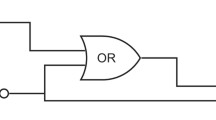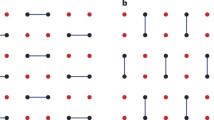Abstract
I discuss the philosophical implications that the rising new science of quantum computing may have on the philosophy of computer science. While quantum algorithms leave the notion of Turing-Computability intact, they may re-describe the abstract space of computational complexity theory hence militate against the autonomous character of some of the concepts and categories of computer science.

Similar content being viewed by others
Notes
It is noteworthy that it is exactly this problem of scaling that, so far, prevents the realization of a quantum computer. In contrast, other aspects of quantum information theory, namely quantum communication and quantum cryptography, are very near technological realization.
Unitarity requires that \(\forall k \neq k^{\prime}:\; _A\langle{a_k}\vert{a_{k^{\prime}}}\rangle_A=0\).
The quantum adiabatic algorithm (Farhi et al. 2000) may give us similar results, contingent upon the existence of an energy gap that decreases polynomially with the size of the input.
References
Adleman, L. M. (1994). Molecular computation of solutions to combinatorial problems. Science, 266, 1021–1024
Aharonov, D. (1998). Quantum computing. In D. Stauffer (Ed.), Annual review of computational physics (vol. VI). Singapore: World Scientific. See also http://xxx.arxiv.org/quant-ph/9812037
Aharonov, D. et al. (2004). Adiabatic quantum computation is equivalent to standard quantum computation. http://xxx.arxiv.org/quant-ph/0405098
Barenco, A. et al. (1995). Elementary gates for quantum computation. Physics Review A, 52, 3457–3467
Calude, C. S. et al. (2003). Transcending the limits of Turing computability. http://xxx.arxiv.org/quant-ph/0304128
Cook, S. A. (1971). The complexity of theorem proving procedures. Proc. 3rd ACM Symposium on Theory of Computing, pp. 151–158
Copeland, J. (1996). The church-turing thesis, Stanford Encyclopedia of Philosophy
Copeland, J. (2002). Hypercomputation. Minds and Machines, 12, 461–502
Davis, M. (1958). The undecidable. New York: Dover
Davis, M. (2003). The myth of hypercomputation. In C. Teuscher (Ed.), Alan turing, life and legacy of a great thinker. Springer: New York.
Deutsch, D. (1985). Quantum theory, the church turing principle, and the universal quantum computer. Proceedings of the Royal Society of London A, 400, 97–117
Dewdney, A. K. (1984). On the spaghetti computer and other analog gadgets for problem solving. Scientific American, 250(6), 19–26
DiVicenzo, D. (1995). Two–bit gates are universal for quantum computation. Physical Review A, 51, 1015–1022
Farhi, E. et al. (2000). Quantum computation by adiabatic evolution. http://xxx.arxiv.org/quant-ph/0001106
Feynman, R. (1982). Simulating physics with computers. International Journal of Theoretical Physics, 21, 467–488
Fodor, J. (1974). Special sciences. Synthese, 2, 97–115
Fodor, J., & Pylyshyn, Z. (1988). Connectionism and cognitive architecture—a critical analysis. Cognition, 28, 3–71
Gandy, R. (1980). Church’s thesis and principles for mechanisms. In J. Barwise et al. (Eds.), The kleene symposium (pp. 123–148). North-Holland: Amsterdam
Garey, M. R., & Johnson, D. S. (1979). Computers and intractability: A guide to the theory of NP-completeness. New York: WH Freeman
Giblin, P. (1993). Primes and programming. Cambridge: Cambridge University Press
Hagar, A., & Korolev, A. (2006). Quantum hypercomputability? Minds and Machines, 16, 87–98.
Hodges, A. (2005). Can quantum computing solve classically unsolvable problems? http://xxx.arxiv.org/quant-ph/0512248
Hogarth, M. (1994). Non-turing computers and non-turing computability. PSA, 94(1), 126–138
Kieu, T. D. (2002). Quantum hypercomputability. Minds and Machines, 12, 541–561
Kieu, T. D. (2003). Computing the noncomputable. Contemporary Physics, 44, 51–71
Kieu, T. D. (2004). A reformulation of Hilbert’s tenth problem through quantum mechanics. Proceedings of the Royal Society A, 460, 1535–1545
Kieu, T. D. (2005). An anatomy of a quantum adiabatic algorithm that transcends the turing computability. International Journal of Quantum Information, 3(1), 177–183
Knill, E. et al. (2000). An algorithmic benchmark for quantum information processing. Nature, 404, 368–370
Linden, N., & Popescu, S. (1998). The Halting problem for quantum computers. http://xxx.arxiv.org/quant-ph/9806054
Moore, C. (1990). Unpredictability and undecidability in dynamical systems. Physical Review Letters, 64, 2354–2357
Myers, J. (1997). Can a universal quantum computer be fully quantum? Physical Review Letters, 78(9), 1823–1824
Nielsen, M. A., & Chuang, I. L. (2000). Quantum computation and quantum information. Cambridge: Cambridge University Press.
Pitowsky, I. (1990). The physical church thesis and physical computational complexity. Iyyun, 39, 81–99
Pitowsky, I. (1996). Laplace’s demon consults an oracle: The computational complexity of predictions. Studies in the History and Philosophy of Modern Physics, 27, 161–180
Pitowsky, I. (2002). Quantum speed-up of computations. Philosophy of Science, 69, S168–S177
Pitowsky, I., & Shagrir, O. (2003). Physical hypercomputation and the church-turing thesis. Minds and Machines, 13, 87–101
Pour-el, M., & Richards, I. (1981). The wave equation with computable initial data such that its unique solution is not computable. Advances in Mathematics, 39, 215–239
Pylyshyn, Z. (1984). Computation and cognition: Toward a foundation for cognitive science. Cambridge: MIT Press.
Rabin, M. (1976). Probabilistic algorithms. In J. Traub (Eds.), Algorithms and complexity: New directions and recent results (pp. 21–39). New York: Academic Press
Schrader, D. et al. (2004). Neutral atoms quantum register. Physical Review Letters, 93(15), 150501
Shagrir, O. (1999). What is computer science about? The Monist, 82, 131–149
Shor, P. (1994). Algorithms for quantum computation: Discrete logarithms and factoring. In S. Goldwasser (Ed.), Proceedings of 35th annual symposium on foundations of computer science (pp. 124–134). IEEE Computer Society Press
Shor, P. (2004). Progress in quantum algorithms. Quantum information processing, 3, 5–13
Sieg, W., & Byrnes, J. (1999). An abstract model for parallel computations. The Monist, 82, 150–164
Smith, W. (2005). Three counterexamples refuting Kieu’s plan for “quantum adiabatic hypercomputation”; and some uncomputable quantum mechanical tasks, Forthcoming
Song, D. (2006). Unsolvability of the halting problem in quantum dynamics. http://xxx.arxiv.org/quant-ph/0610047
Turing, A. (1936). On computable numbers, with an application to the Entscheidungsproblem, reprinted in M. Davis (1958)
Vergis, A. et al. (1986). The complexity of analog computation. Mathematics and Computers in Simulation, 28, 91–113
Wolfram, S. (1985). Undecidability and intractability in theoretical physics. Physical Review Letters, 54, 735–738
Author information
Authors and Affiliations
Corresponding author
Rights and permissions
About this article
Cite this article
Hagar, A. Quantum Algorithms: Philosophical Lessons. Minds & Machines 17, 233–247 (2007). https://doi.org/10.1007/s11023-007-9057-3
Published:
Issue Date:
DOI: https://doi.org/10.1007/s11023-007-9057-3




